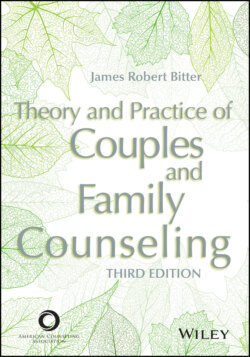Читать книгу Theory and Practice of Couples and Family Counseling - James Robert Bitter - Страница 78
Think About Your Evolving Role as a Family Practitioner
ОглавлениеOne of your most important reflections will be on your evolving role as a family practitioner. What does it mean to you to be a family counselor? What do the processes and activities in your work say about you as a professional? As you read about the different theories and models of family counseling, you will have to consider a wide range of roles and functions. Some roles will include directive interventions; some will be more collaborative. Some roles will focus on assessment of dysfunction and change; some will focus on strengths and resiliency. Some will be interested in communication and meaning; others will be primarily interested in behaviors. Which of these roles and functions are a good fit for you?
Salvador Minuchin suggested that his role as a family therapist evolved over more than 30 years of practice (S. Minuchin & Zeig, 2005b). He was not the same structural family therapist at the end of his career as he first described in the 1970s. His style and process changed as he grew older. He learned from the families he interviewed, and he learned from his peers. He noted that he “copied” many aspects of style from fellow therapists like Carl Whitaker, Jay Haley, and Michael White. When he copied these people, he may have borrowed a way of phrasing a question, giving a directive, or engaging certain family members, but he used these interventions “with a Spanish accent”; that is, he integrated new and different styles and made them his own.
You cannot define your professional role once and for all. It will evolve and change depending on the clients with whom you work, the services you provide, the location and setting of your practice, and the training and collaborations in which you engage. My own work has led me to a belief in encouragement, a focus on strength and resiliency in families, the dismantling of constraints and restrictions, and the facilitation of change through enactments and the development of new experiences.
